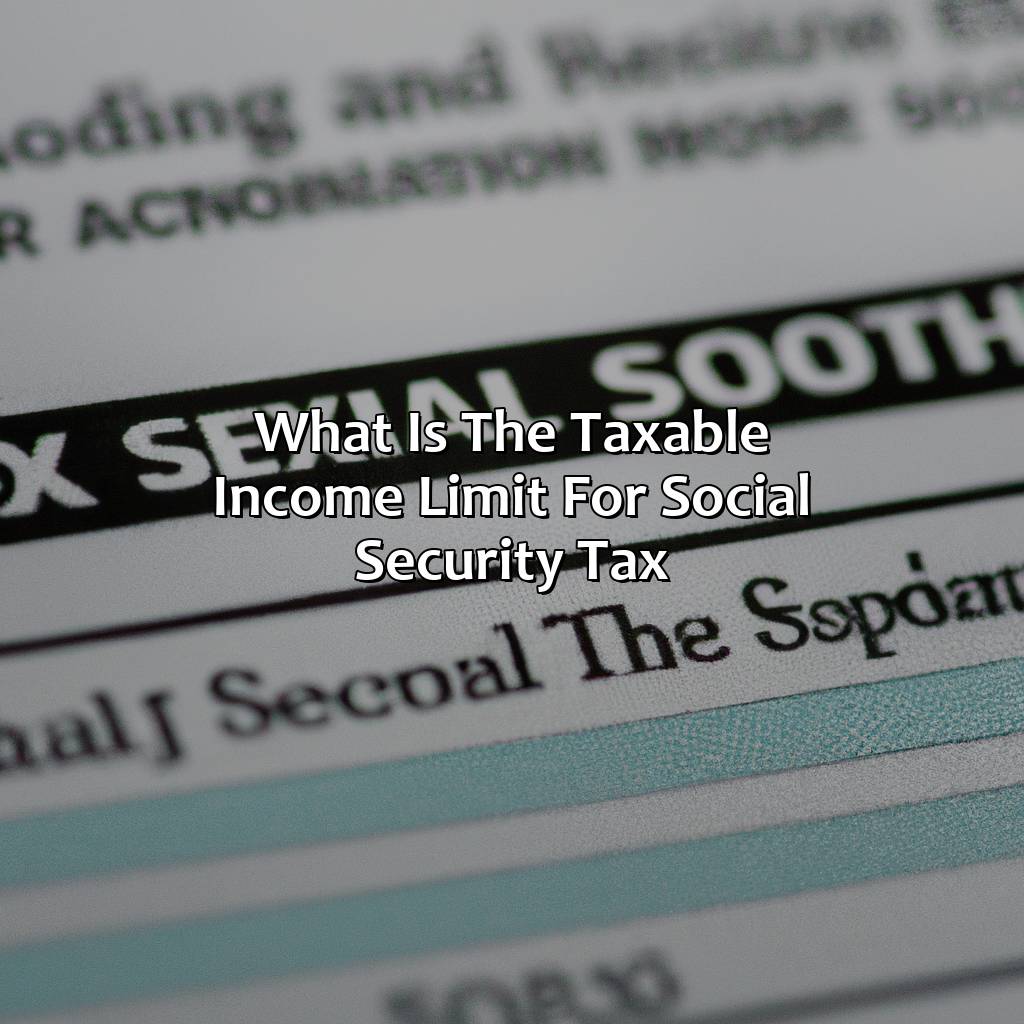What Amount Of Income Is Taxed For Social Security?
Key Takeaway:
- Social Security tax is a payroll tax that pays for retirement, disability, and survivor benefits for millions of Americans.
- Social Security tax is calculated as a flat rate of 12.4% on earned income up to a certain limit, with half paid by the employee and half by the employer.
- The taxable income limit for Social Security tax changes each year and is based on the national average wage index. As of 2021, the limit is $142,800. Income earned above this limit is not subject to Social Security tax.
Feeling overwhelmed by the complexities of Social Security tax? You’re not alone! This article will help you understand exactly what income is taxed and how much you need to pay. Keep reading to find out how to navigate Social Security taxation with ease.
What is social security tax?
Social security tax is a payroll tax that provides benefits for retirees, disabled individuals and survivors. It has been active since the 1930s and insures workers and their families against loss of income. This tax is an essential component of the social security system and is imposed on both employees and employers. Its rate and the amount of income subject to the tax are determined by the Federal Insurance Contributions Act (FICA).
FICA directs that employees pay 6.2% of their earnings up to a wage ceiling, while employers pay an equivalent percentage as their part in the contribution. Currently, if an employee earns beyond $142,800 annually, the remaining income is not subject to social security tax. The social security tax deduction from employees’ paychecks is shown as Federal Insurance Contributions Act (FICA) on their pay stubs.
It is essential to note that some states may impose the state-level equivalent of social security tax. Therefore, social security tax deductions may be made from both employees’ state and federal taxes. One example is California’s payroll tax, which is a deduction that is taken at the state level and is similar in function to the social security tax.
A self-employed individual may also be required to pay social security taxes. The Self-Employment Contributions Act (SECA) requires those who earn a minimum of $400 from self-employment to pay both the employer and employee share of social security taxes.

Image credits: retiregenz.com by David Arnold
How is social security tax calculated?
Social security tax is based on a fixed percentage of an individual’s earnings, which varies from year to year. The calculation is based on the Social Security wage base limit, which determines the maximum amount of earnings subject to the tax. In 2021, the wage base limit is $142,800, which means that wages up to this amount can be taxed at a rate of 12.4%. Employers and employees each pay half of the tax, with self-employed individuals paying both the employer and employee portions.
It’s important to note that not all income is subject to social security tax. For example, income from investments, pensions, and some government benefits are not taxable for Social Security purposes. Additionally, for those who earn over the wage base limit, any additional income beyond that amount is not subject to social security tax.
Understanding the calculation of social security tax is crucial for individuals and employers to accurately budget and plan for their expenses. It’s worth noting that the taxation system for social security has undergone several changes over the years to accommodate the evolving economy and demographics.

Image credits: retiregenz.com by Yuval Duncun
What is the taxable income limit for social security tax?
The taxable income limit for Social Security tax is a crucial factor to understand for tax-paying individuals. The maximum taxable income amount subject to Social Security tax changes each year and is decided by the Social Security Administration. The current taxable income limit for Social Security tax is $142,800 for the year 2021. This means that if an individual’s earned income for the year exceeds this amount, they will not be taxed for Social Security on any amount of income above the limit.
It is important to note that the Social Security tax rate applied to the taxable income is fixed at 6.2% for employees and employers, totaling 12.4% for self-employed individuals. The tax funds the benefits provided to current retirees, individuals with disabilities, and the families of deceased workers.
However, it is crucial to understand that even if an individual reaches the taxable income limit for Social Security tax, they will still have to pay Medicare tax, which has no income limit.
In 1975, the taxable income limit for Social Security tax was introduced as a way to ensure that the Social Security system remains financially stable. Since then, the limit has changed periodically with the increase in the national average wage index. It is expected to increase in the future as the cost of living and wage scales continue to grow.

Image credits: retiregenz.com by David Jones
What happens to the social security tax after reaching the limit?
After reaching the maximum taxable earnings for social security, the tax liability stops incrementing. The excess earnings do not attract Social Security taxes anymore. It is important to note that only the Social Security tax portion stops incrementing, and the Medicare tax continues to remain applicable on all earnings. The taxable income limit for Social Security taxes keeps increasing each year depending on the inflation rate.
While after reaching the Social Security maximum taxable income, the tax liability stops incrementing, it is imperative to remember that the Medicare tax rates continue to apply on all income earned. The Social Security Wage Base is adjusted each year based on the inflation rate, resulting in possible increases from one year to the next, albeit not always.
It is essential to plan one’s earnings, making sure that they stay under the Social Security maximum taxable income. This allows individuals to avoid overpaying taxes and take advantage of the higher take-home pay. Reviewing pay statements and checking the Social Security wage base annually can help ensure that individuals do not miss the chance to reduce their tax liability.
Act now and review your pay statements to ensure that you are not missing out on overpaying taxes due to Social Security maximum taxable income. Taking proactive measures to stay informed can help individuals manage their tax liability effectively.

Image credits: retiregenz.com by Joel Washington
What are the exceptions to the social security tax?
Social security tax is imposed on most types of income received by employees. However, there are certain exceptions to this tax. These exceptions may include income received from certain types of employers or from certain types of services provided. Additionally, certain types of benefits may also be exempt from social security tax.
Furthermore, it is important to note that self-employed individuals are subject to a different type of social security tax, known as the self-employment tax. However, the exceptions to this tax may still apply in certain circumstances.
It is recommended to seek the advice of a financial professional to determine if any exceptions apply to your individual situation. By taking advantage of these exceptions, individuals may be able to reduce their overall tax burden and maximize their take-home income.

Image credits: retiregenz.com by Yuval Arnold
Some Facts About What Amount of Income is Taxed for Social Security:
The current tax rate for Social Security is 6.2% for employees and employers, and 12.4% for self-employed individuals. (Source: SSA)
The Social Security tax only applies to the first $142,800 of income earned in 2021. (Source: SSA)
If you earn more than $142,800 in 2021, you will not be required to pay Social Security taxes on that additional income. (Source: SSA)
The Social Security tax rate has remained unchanged since 1990. (Source: SSA)
Social Security taxes are separate from and in addition to income taxes. (Source: IRS)
FAQs about What Amount Of Income Is Taxed For Social Security?
What amount of income is taxed for social security?
The contribution rate for Social Security is 6.2% on the first $142,800 earned in 2021.
Is there a limit on the amount of income that can be taxed for social security?
Yes, the contribution rate for Social Security is only applied to the first $142,800 earned in 2021. Any income earned above that amount is not subject to Social Security taxes.
What is the self-employment tax limit for social security in 2021?
The self-employment tax rate for Social Security is 12.4% on the first $142,800 earned in 2021 for self-employed individuals.
How is Social Security taxed for high-income earners?
High-income earners may have to pay an additional 0.9% Medicare tax on income over $200,000 for individuals or $250,000 for married couples filing jointly. This extra tax does not apply to Social Security taxes.
What happens if I go over the limit for Social Security taxes?
If you have multiple jobs and your combined income exceeds the $142,800 limit, you may have excess Social Security taxes withheld. You can claim a credit for the overpayment on your tax return.
Do non-U.S. citizens have to pay Social Security taxes?
Non-U.S. citizens who work in the United States must pay Social Security taxes on their earnings, as long as they are not exempt due to a Totalization Agreement between the U.S. and their home country.
 Checkout this IRS Loophole
Checkout this IRS Loophole 
